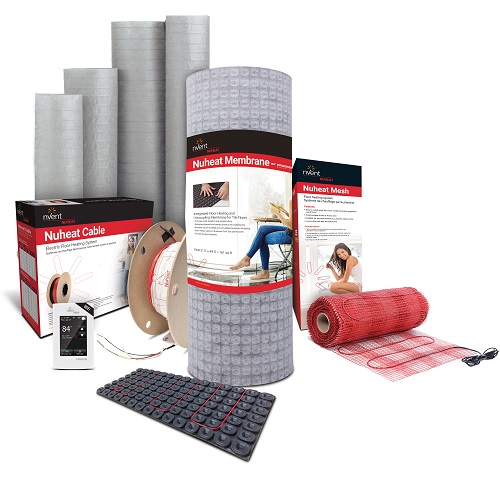Have you ever wondered if nVent NUHEAT Floor Heating Systems are environmentally sustainable? The answer is yes! Below, we breakdown what makes nVent NUHEAT an eco-friendly solution…
Electric floor heating is an example of direct electric heating, which is 100% efficient. In other words, 100% of the energy input is converted to heat energy, making nVent NUHEAT systems a green heating alternative.
• This compares to a “high efficiency” furnace that might be 90% efficient (10% of the energy input is converted into something other than heat such as noise or movement).
• An electric boiler system will also be less than 100% efficient because of heat loss that occurs before water reaches the heated area and because additional energy is required to circulate the water.
• For nVent NUHEAT systems, heating occurs at the point of delivery and there are no moving parts so all energy expended gets converted into soothing radiant heat.
Radiant floor heating is highly effective at adding comfort heat to an indoor space.
• Heating the floor also heats objects and people that touch the floor through conduction. Solid objects have greater thermal mass and conductivity than air. That means that the same level of comfort can be achieved at a lower ambient air temperature when compared to forced air, radiators, or baseboards.
• Radiant floor heat adds warmth to the area that people live (on the floor, within 7 feet of the floor) and evenly distributes that warmth throughout the heated area. This contrasts with forced air, radiators, and baseboards that concentrate heat near the point of entry and waste energy heating air that ends up near the ceiling, forcing colder air down to where the occupants are.
• Air movement introduced by forced air systems speeds evaporation, which causes people to feel cold. This requires more heat, which requires more air movement, and the cycle continues.
• Forced air also circulates dust, allergens, pathogens, and other airborne contaminants, while radiant heat does not, meaning nVent NUHEAT systems support a healthier indoor environment.
Depending on how your electricity is generated, electric floor heating can have a significantly lower carbon footprint than other options for home heating, making it more environmentally friendly.
• Furnaces or boilers that use natural gas, propane, heating oil, wood, or any other combustible fuel produce carbon dioxide and other pollutants as a bi-product.
• Wind, solar, hydro-electric, and nuclear power have near-zero greenhouse gas production.
• Even electric power plants that use fossil fuels will tend to burn cleaner than many in-home combustion heating systems.
Electric radiant floor heat is easier to zone and cycles on and off to maintain temperature of a thermal mass (the flooring assembly). It also comes up to temperature much quicker than other systems (15 to 30 minutes in a good installation) for on-demand heating. This means…
• Heat can be used when/where it’s required.
• Electric radiant floor heat is not on all the time. For example, a typical bathroom might only run for 5½ hours in a day, even though the floor stays warm. This contrasts with water radiant, which must always be on to maintain the temperature of circulating water that is heating and cooling with every lap through the circulation system.
• Water radiant can take 4 to 12 hours to come up to temperature and is not as effectively “zone-able”.
• Forced air is also less “zone-able” because it takes a longer time for the low thermal mass of air to warm a space.
• The “Early Start” feature of nVent NUHEAT thermostats ensures the system comes on exactly when needed for it to be up to temperature at the scheduled time. nVent NUHEAT thermostats learn how long this process takes by analyzing recent “time-to-temp” and are continually adjusting to hit the set point on schedule as the weather changes.
• The mobile apps and smart home integrations of the Signature thermostat allow a greater degree of control and automation, further enhancing the opportunities for more efficient operation.
To learn more about nVent NUHEAT Floor Heating Systems, visit www.nuheat.com. To get in touch with an nVent NUHEAT Floor Heating expert, click here.



